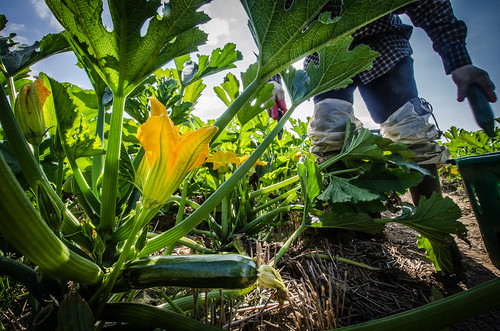
For their communities, small farmers are anything but small. Their contributions are quite large – not only do they provide food for local residents – they also create jobs and economic opportunities. However, retailer requirements and the cost of marketing can make it difficult for small producers to scale up and reach larger markets. USDA’s Agricultural Marketing Service (AMS) is working to remove those barriers by offering a number of services that help small and local producers grow and sustain their businesses.
In the produce industry, more and more retailers require suppliers to have Good Agricultural Practices (GAP) certification, which verifies that the operation is following industry-recognized food safety practices and recommendations from the Food and Drug Administration. For small farmers, getting GAP certified can be difficult and expensive. To help offset some of these costs, the AMS Specialty Crops Inspection Division and Transportation and Marketing Program are partnering with the Wallace Center at Winrock International to implement a Group GAP Pilot Project.
The pilot offers cooperatives, food hubs and other marketing organizations a way to work collectively to undergo GAP certification as a group. This allows groups of small producers to pool resources to implement food safety training programs and share the cost of certification.
Under the pilot, participants develop and implement their own quality management systems (QMS) and food safety programs based on internal inspections of their members and verification by USDA-licensed auditors. Five groups across the country are taking part in the pilot: Upper Peninsula Food Hub, Michigan; Organic Valley, Wisconsin; Lake Country Community Development, Montana; ELANCO School District, Lancaster County, Pennsylvania; and Good Natured Family Farms, Missouri.
AMS trains participants and works with individuals and groups to provide resources as they prepare for certification. To foster further communication among participants, AMS also created a website that allows participants to collaborate on the design of their QMS. If the pilot effectively enhances market opportunities for these small producers, we will consider expanding the program nationwide.
Another new AMS program that is making a big difference for small producers is the USDA Grass Fed Program for Small and Very Small Producers. This program was designed as a verification tool for producers. It allows them to market their cattle and sheep as USDA certified grass-fed, thereby increasing the animals’ market value and creating new economic opportunities for the producers.
Cascade Brook Farm in New Hampshire, owned and operated by Ed and Cindy Canane, was the first operation to be certified under the program. The Cananes proudly raise 100 percent grass-fed, humanely-raised, Black Angus cattle at the farm. Ed and Cindy are thrilled with the new program. “We are a direct seller and have always admired the USDA's Grass Fed Certification Program. But as a small producer, the application costs were prohibitive for us. We could not believe it when AMS came out with this program! It is perfectly suited for us—and thousands of others like us across the U.S. And they made the process streamlined and extremely cost-effective for small producers,” they said.
USDA and AMS are committed to creating opportunities for producers of all sizes. If you are a producer interested in the Grass Fed Program for Small and Very Small Producers, be sure to check out materials from our recent webinar. If you are a specialty crop producer, visit our website to learn how our services can help you reach larger markets.
